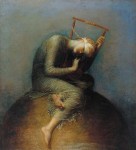Ministry is fundamentally about serving the ‘congregation’ in contrast to being primarily about serving the Gods, as in Priesthood. The two go hand in hand but it is worthwhile to discuss them separately. The metaphorically upward movement of priesthood differs from the downward movement of ministry. Pagan ministry is about serving the people, or in our case the peoples…
In one sense anyone can minister, but it is also one of the three professions in Western civilization which, along with the doctor and the lawyer, historically and practically requires significant education and training. Four to five years in a seminary is generally the term these days for an M.Div. or Master of Divinity degree. Graduation requires a thorough knowledge of (mostly Western) theology and religious history. It also requires a serious change, called ministerial formation, in the character of the minister-to-be without which seminary education would be merely academic. This is usually delivered while learning the ‘Arts of Ministry’ and also through a process called ‘Clinical Pastoral Education’. The result is a professional servant of the religious population or ‘congregation’ who is knowledgeable and skilled in liturgy, institutional and community development, and pastoral care, as well as sensitive to the critical or ‘prophetic’ leadership role they are in. I will discuss these in turn.
Theology
As you might expect, the minister-in-training is taught a great deal about theology. In conservative seminaries this is usually quite doctrinal, but in liberal seminaries, like the ones I attended, one is taught how to do theology, rather than learn a set of ‘correct’ answers to theological questions and issues. This enables the minister to develop a mature theology as time advances and culture changes, and so be more adaptive and helpful. It also lets the student operate from and form their own theological basis. Thus it was possible, even encouraged for me to do so as a Pagan, creating a Pagan theological foundation as I advanced. Since I was in a Unitarian Universalist school, I was also required to become proficient in thinking in many theological frameworks because I was to minister to the UU’s very diverse population. The minister becomes very good at translating.
History
There was also an enormous volume of history to absorb. Except for the Jews, the Ancients were not well represented; but getting the actual history of them (not what you find in the Tanak, the Hebrew Bible) was fascinating and paralleled to Egyptian and Mesopotamian history with which the Israelites interacted. I filled in those missing pieces in my electives. Christian history, as you would imagine, was extensive and painfully hard to read. At first, it was of the destruction of the ancient religions of the Mediterranean and Europe, then it quickly turned to the bloody conflicts between Christian sects in the early centuries, to the heresies in the Mediaeval period leading to the Protestant Reformation and Wars of Religion, and eventually to the present détente. Observing the establishment of doctrinal positions shifting with political change was a powerful lesson. I’ve come to define ‘history’ as the list all the things we’ve tried, most of which didn’t work. Knowing the errors of your forebears is the best way to avoid them—precious knowledge that would serve us well today as we begin to replicate early Christian history.
Being first at the University of Chicago and later at the Graduate Theological Union in Berkeley, I also had access to the rest of the world’s theology and religious history. I found them invaluable in understanding the position of our Pagan religion in its proper context, where we agree and where we differ with our neighbors and kin. Naturally, the highly qualified, graduate level instruction also showed the complexity and ambiguity in any understanding of these cultures.
Tempering the Soul
While the intellect is being trained, the ‘soul’ of the minister is being tempered. Through deceptively simply named Arts of Ministry classes, seminarians were asked to reflect upon the intellectual knowledge they had obtained and then had to express their opinions and views in an intensely challenging environment led by a senior minister. Everything said was a target, every opinion was shredded, every statement hammered on in emotionally and mentally exhausting sessions, even if you were not today’s focus of attention. This was a spiritual and psychological, not an intellectual process, that purged the future minster of sloppy thought, bad philosophy, unconscious assumptions and any other weakness of personality that would make them less than effective in serving the spiritual and institutional needs of the congregation members.
It was also in this setting that the oral lore of ministry was most often transmitted. For the last five hundred years or more, a vast body of knowledge has been developed from the successes and many more failures of ministers in their effort to serve their people. This precious distillate of lives dedicated to service can only be received from the community of those who have received it, from those who have gone before and made it part of their blood. I am deeply grateful to those who imparted their wisdom to me. I am not a major fan of lineages or transmissions, but experience shared counts for something, in this case a lot.
On the more practical side of the education, the seminarian has opportunity to lead worship in congregations near their residence and eventually is placed in an internship for six months to a year under the mentorship of a senior minister. Sadly internship did not work out for me being Pagan and in seminary in the early 1990s, but conditions have greatly improved.
Pastoral Ministry
Pastoral skills are taught in a special program usual run out of hospitals, mental health facilities and prisons called Clinical Pastoral Education. In this, you are brought up against one of the most vital changes you have to make in order to be a minister. Confronted with the gravely ill or dying, the mentally disturbed, or the incarcerated, and provided guidance by a senior minister and your peer group, the natural impulse to ‘fix’ is carefully broken. You are led into becoming an other-centered caregiver, one where you give care not to feed your ego-needs, which is destructive to the ‘client’, but truly in service to them. Not easy, hard on the heart, but a necessary process for all of the caring professions. Some of these programs are even open to folks not in seminary and would be a powerful way of training Pagan caregivers. The costs are relatively low, and there are part-time as well as full-time programs. It would be great to see Pagan-focused programs developed.
Prophetic Ministry
So far we have discussed the intellectual and pastoral training of a minister. In Protestant religious space, the intellectual work feeds directly into liturgy, meaning sermons, and while Protestants are very good at public speaking, there is not much ritual knowledge there. Pagans would have to supplement. The intellectual education also enables the minister to provide thought leadership and institutional guidance. The Pastoral role is clear: caring for the emotional and spiritual needs of the population. Together, the knowledge of religious thought and history along with other-centered care leads to the last major role of the minister, the Prophetic. Once meaning “speaking-for” the Deity and ultimately derived from that authority, although not usually meaning channeling these days, it is the task of critique and persuasive correction of the people. It is the often unpleasant and rarely thanked job of telling people where they are wrong. It is easy to lead when everyone wants to follow you and they agree with you. But when they don’t, when in your judgement they are making some kind of error, it is the duty of the minister to get up and use persuasion to change the people’s hearts and minds, their words and deeds—even at the risk of losing your job, which may be supporting your family. This requires courage and conviction, and is best backed up by education and compassion.
I believe we need more Pagans trained in this way. We need to be as good at this, even better than Christian and other ministers because we are fighting an uphill battle for acceptance. Like Ginger Rogers, we need to be able to do this “backwards and in heels”. We need to know the world’s range of theological positions, as well as the entire western lexicon of spiritual thought.
We have one seminary today that is working for full accreditation, Cherry Hill. It is to be applauded for raising the money to be able to pay for that status, and the work before it is daunting. Being able to provide in one school the full range of education is so difficult today that most major seminaries are part of consortia, which lets each sect, denomination, or religion focus on their specialized curricula and draw on the others for their areas of competence. If CHS was part of a consortium, it would be able to leverage the other schools’ biblical and historical skills which are utterly necessary for a religious professional today in whatever field of service. Likewise, CHS is challenged to deliver the context for ministerial formation. Creating the culture in which the lore of ministry can be transmitted requires being embedded in that tradition and, therefore, a staff that was raised in it. Equally difficult for the process of ministerial formation is problem that distance learning creates when the immediate pressure of being face to face with a intensely challenging senior is mitigated by the computer screen. Hopefully over time and with support, CHS can mature into the seminary it desires to be.
Ministry is the other half of the job of religious leadership and service, along with Priesthood. Seminary training is essential to the delivery of that service at a professional level, paid or not. We have the fortune of one institution that is striving to deliver that training, but we need also take advantage of the more broadly available liberal seminaries that welcome Pagans. We are in a very challenging time for our religion as it diversifies and struggles to create and maintain its identity. Professional religious—trained in the tools humans have been long developing and heirs to a deep tradition of service—will help Pagans avoid many of the errors of the past and lead our community into its maturity and strength.
















